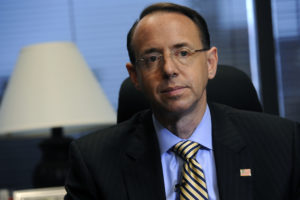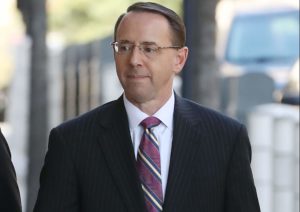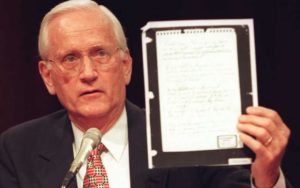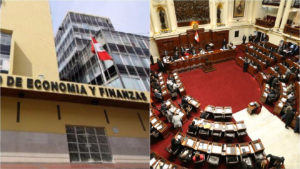Mes: mayo 2017
Flashback to F.B.I. Chief’s ’93 Firing, and to Saturday Night Massacre
The Federal Bureau of Investigation was established in 1908 when the Justice Department created an agency to conduct investigations for it. The first leaders of the F.B.I., known then as chief examiners, were appointed by the attorney general. That custom remained until 1972, when the F.B.I. director, J. Edgar Hoover, died in office after overseeing the bureau for 48 years.
In the years before Hoover’s death, a new confirmation process for the F.B.I. director was developed. After Hoover, the director was nominated by the president and confirmed by the Senate. In 1976, it became law that the director would be limited to a 10-year term.
In its 109-year history, only one F.B.I. director had been fired — until Tuesday, when President Trump fired James B. Comey. In July 1993, President Bill Clinton fired William S. Sessions, who had been nominated to the post by President Ronald Reagan in 1987. Mr. Clinton said his attorney general, Janet Reno, reviewed Mr. Sessions’s leadership and concluded “in no uncertain terms that he can no longer effectively lead the bureau.”
Mr. Sessions had been cited for ethical lapses, including taking free trips on F.B.I. aircraft and using government money to build a $10,000 fence at his home. Mr. Sessions was asked to resign, and was fired when he refused to do so. “Despite the president’s severe tone, he seemed to regret having to force Mr. Sessions from his post,” The New York Times wrote about his dismissal.
Similarly, Mr. Trump fired Mr. Comey on the recommendation of his attorney general, Jeff Sessions. (No relation to William S. Sessions.) There are no United States statutes that discuss the president’s authority to remove the F.B.I. director.
The termination of Mr. Comey also brought to mind for many the so-called Saturday Night Massacre. On Oct. 20, 1973, President Richard Nixon, seeking to fire Archibald Cox, the special prosecutor leading the Watergate investigation, accepted the resignations of Attorney General Elliot L. Richardson and Deputy Attorney General William D. Ruckelshaus after they refused to take action. Robert Bork, the solicitor general, complied with the president’s order to fire Mr. Cox. Mr. Nixon also abolished the special prosecutor’s office.
But Mr. Nixon did not fire the director of the F.B.I.
Mr. Comey was in the fourth year of his 10-year term. The term limits were imposed after Watergate.; only one director, Robert S. Mueller III, was allowed to serve beyond 10 years. Mr. Mueller, who became director just before the terrorist attacks of Sept. 11, 2001, was asked by President Barack Obama to stay on an additional two years, citing “ongoing threats facing the United States.” The Senate unanimously approved the extension.
Two men had their nominations for director withdrawn. In April 1973, Mr. Nixon withdrew the nomination of L. Patrick Gray III, and in September 1977, President Jimmy Carter withdrew the nomination of Frank M. Johnson Jr.
In: nytimes
R. Kelly – Burn It Up ft. Wysin, Yandell
Rosenstein’s Case Against Comey, Annotated
Contextualizing the deputy attorney general’s memorandum on the former FBI director

Depúty Attorney General Rod Rosenstein. Image: http://www.trbimg.com/img-591241de/turbine/bal-rod-rosenstein-fbi-memo-20170509
In a surprising move on Tuesday, President Trump abruptly fired James Comey, the director of the FBI and the official leading the investigation into whether Trump aides colluded with Russia to sway the U.S. presidential election. In his letter dismissing Comey, Trump told him: “While I greatly appreciate you informing me, on three separate occasions, that I am not under investigation, I nevertheless concur with the judgment of the Department of Justice that you are not able to effectively lead the bureau.”
The White House said that Trump acted on the recommendations of Attorney General Jeff Sessions and Deputy Attorney General Rod Rosenstein. The longest letter released was a memorandum to Sessions from Rosenstein laying out the case for Comey’s dismissal. In the memo, Rosenstein criticizes Comey for his handling of the investigation into former Secretary of State Hillary Clinton’s private email server, and offers examples of bipartisan condemnation of Comey’s actions.
For context, we’ve annotated Rosenstein’s letter below.
May 9, 2017
MEMORANDUM FOR THE ATTORNEY GENERAL
FROM: ROD J. ROSENSTEIN
DEPUTY ATTORNEY GENERAL
SUBJECT: RESTORING PUBLIC CONFIDENCE IN THE FBI
The Federal Bureau of Investigation has long been regarded as our nation’s premier federal investigative agency. Over the past year, however, the FBI’s reputation and credibility have suffered substantial damage, and it has affected the entire Department of Justice. That is deeply troubling to many Department employees and veterans, legislators and citizens.
The current FBI Director is an articulate and persuasive speaker about leadership and the immutable principles of the Department of Justice. He deserves our appreciation for his public service. As you and I have discussed, however, I cannot defend the Director’s handling of the conclusion of the investigation of Secretary Clinton’s emails, and I do not understand his refusal to accept the nearly universal judgment that he was mistaken. Almost everyone agrees that the Director made serious mistakes; it is one of the few issues that unites people of diverse perspectives.
The director was wrong to usurp the Attorney General’s authority on July 5, 2016, and announce his conclusion that the case should be closed without prosecution.
It is not the function of the Director to make such an announcement. At most, the Director should have said the FBI had completed its investigation and presented its findings to federal prosecutors. The Director now defends his decision by asserting that he believed attorney General Loretta Lynch had a conflict. But the FBI Director is never empowered to supplant federal prosecutors and assume command of the Justice Department. There is a well-established process for other officials to step in when a conflict requires the recusal of the Attorney General. On July 5, however, the Director announced his own conclusions about the nation’s most sensitive criminal investigation, without the authorization of duly appointed Justice Department leaders.
Compounding the error, the Director ignored another longstanding principle: we do not hold press conferences to release derogatory information about the subject of a declined criminal investigation. Derogatory information sometimes is disclosed in the course of criminal investigations and prosecutions, but we never release it gratuitously. The Director laid out his version of the facts for the news media as if it were a closing argument, but without a trial. It is a textbook example of what federal prosecutors and agents are taught not to do.
In response to skeptical question at a congressional hearing, the Director defended his remarks by saying that his “goal was to say what is true. What did we do, what did we find, what do we think about it.” But the goal of a federal criminal investigation is not to announce our thoughts at a press conference. The goal is to determine whether there is sufficient evidence to justify a federal criminal prosecution, then allow a federal prosecutor who exercises authority delegated by the Attorney General to make a prosecutorial decision, and then – if prosecution is warranted – let the judge and jury determine the facts. We sometimes release information about closed investigations in appropriate ways, but the FBI does not do it sua sponte.
Concerning his letter to the Congress on October 28, 2016, the Director cast his decision as a choice between whether he would “speak” about the decision to investigate the newly-discovered email messages or “conceal” it. “Conceal” is a loaded term that misstates the issue. When federal agents and prosecutors quietly open a criminal investigation, we are not concealing anything; we are simply following the longstanding policy that we refrain from publicizing non-public information. In that context, silence is not concealment.
My perspective on these issues is shared by former Attorneys General and Deputy Attorneys General from different eras and both political parties. Judge Laurence Silberman, who served as Deputy Attorney General under President Ford, wrote that “it is not the bureau’s responsibility to opine on whether a matter should be prosecuted.” Silberman believes that the Director’s “Performance was so inappropriate for an FBI director that [he] doubt[s] the bureau will ever completely recover.” Jamie Gorelick, Deputy Attorney General under President Clinton, joined with Larry Thompson, Deputy Attorney General under President George W. Bush, to opine that the Director had “chosen personally to restrike the balance between transparency and fairness, departing from the department’s traditions.” They concluded that the Director violated his obligation to “preserve, protect and defend” the traditions of the Department and the FBI.
Former Attorney General Michael Mukasey, who served under President George W. Bush, observed the Director “stepped way outside his job in disclosing the recommendation in that fashion” because the FBI director “doesn’t make that decision.”
Alberto Gonzales, who also served as Attorney General under President George W. Bush, called the decision “an error in judgement.” Eric Holder, who served as Deputy Attorney General under President Clinton and Attorney General under President Obama, said the Director’s decision“was incorrect. It violated long-standing Justice Department policies and traditions. And it ran counter to guidance that I put in place four years ago laying out the proper way to conduct investigations during an election season.” Holder concluded that the Director “broke with these fundamental principles” and “negatively affected public trust in both the Justice Department and the FBI.”
Former Deputy Attorneys General Gorelick and Thompson described the unusual events as“real-time, raw-take transparency taken to its illogical limit, a kind of reality TV of federal criminal investigation,” that is “antithetical to the interests of justice.”
Donald Ayer, who served as Deputy Attorney General under President H.W. Bush, along with former Justice Department officials, was“astonished and perplexed” by the decision to “break[] with longstanding practices followed by officials of both parties during past elections.” Ayer’s letter noted, “Perhaps most troubling… is the precedent set by this departure from the Department’s widely-respected, non-partisan traditions.”
We should reject the departure and return to the traditions.
Although the President has the power to remove an FBI director, the decision should not be taken lightly. I agree with the nearly unanimous opinions of former Department officials. The way the Director handled the conclusion of the email investigation was wrong. As a result, the FBI is unlikely to regain public and congressional trust until it has a Director who understands the gravity of the mistakes and pledges never to repeat them. Having refused to admit his errors, the Director cannot be expected to implement the necessary corrective actions.
Comey sought more resources for Russia investigation before he was fired, officials say

Rod Rosenstein, Deputy Attorney General: “(…) I cannot defend the Director’s handling of the conclusion of the investigation of Secretary Clinton’s emails (…)”. Image: https://heavyeditorial.files.wordpress.com/2017/03/gettyimages-615189902-e1488467829409.jpg?quality=65&strip=all&strip=all
FBI Director James B. Comey met last week with Rod Rosenstein, the new deputy attorney general, and asked for both money and personnel to step up the investigation into possible coordination between Russian intelligence and members of Donald Trump’s presidential campaign, according to two officials who spoke on condition of anonymity.
One Democratic congressional aide said the request was for a “significant increase in resources.”
But a Justice Department spokesman denied that Comey had made the request.
“Totally false,” said Ian Prior. Comey “never made the request for more resources and money for the Russia investigations.”
Prior declined to comment on whether Rosenstein and Comey met last week, and what was discussed. The FBI declined to comment.
Trump abruptly fired Comey on Tuesday, saying he based his decision on a recommendation from Rosenstein and Atty. Gen. Jeff Sessions.
In a letter dated Tuesday, Rosenstein said Comey should be replaced because he had breached department protocol by repeatedly making statements about the FBI investigation into Democratic presidential nominee Hillary Clinton’s emails.
But the future of the Russia investigations looms over Trump’s decision to fire Comey.
Rosenstein, who was confirmed as deputy attorney general on April 25, is heading the Justice Department’s investigation into the Russia dealings.
Sessions recused himself after news reports revealed he had met with the Russian ambassador twice during the campaign and failed to disclose the meetings in his Senate confirmation hearing.
In: latimes
The last president to fire an FBI director? Bill Clinton
It’s been 24 years since a president fired the director of the Federal Bureau of Investigation.
In 1993, President Clinton ousted William Sessions as FBI director after Sessions refused to voluntarily step down amid ethical concerns. It was the first and only time to happen in U.S. history. That is, until Donald Trump fired James Comey.
Sessions, appointed by Ronald Reagan, had been under investigation by the Justice Department’s Office of Professional Responsibility during George H.W. Bush’s final year in office.
Here’s how The Times reported the findings at the time:
“The Justice Department report found, among other things, that Sessions had engaged in a sham transaction to avoid paying taxes on his use of an FBI limousine to take him to and from work, that he had billed the government for a security fence around his home that provided no security and that he had arranged business trips to places where he could meet with relatives.”
Sessions dismissed the findings and refused to resign.
Clinton, at the recommendation of his attorney general, Janet Reno, dismissed Sessions.
“We cannot have a leadership vacuum at an agency as important to the United States as the FBI,” Clinton said at a White House news conference. “It is time that this difficult chapter in the agency’s history is brought to a close.”
Sessions serves on the board of directors for non-profit think tank, The Constitution Project. According to the website, he is a partner at the Holland & Knight law firm Washington, D.C.
In: latimes
Defiant FBI Chief Is Fired by President : Law enforcement: Alleged ethical abuses by Sessions are cited as reason for dismissal. He refused to resign.
MEF sobre aumento de pensiones de FF.AA. y PNP: Congreso no puede emitir leyes con iniciativa de gasto
El ministerio afirma que emitió opinión desfavorable al proyecto de ley en cuestión, pues el Legislativo no puede emitir leyes con iniciativa de gasto.
El Ministerio de Economía y Finanzas (MEF) aseguró que los proyectos de ley aprobados por el Congreso para homologar las pensiones de las Fuerzas Armadas y de la Policía Nacional, no contaban con la opinión favorable por tener iniciativa de gasto.
Opinión en contra. “El ministerio informa que el 22 de marzo del año en curso emitió opinión desfavorable a los citados proyectos de Ley, toda vez que vulneran los artículos 78 y 79, y la Primera Disposición Final y Transitoria de la Constitución Política del Perú”, señala el sector en un comunicado.
La semana pasada el pleno del Parlamento aprobó el proyecto de ley de la Comisión de Defensa que reordena las pensiones del personal militar y policial. El incremento presupuestal que el gobierno deberá destinar al Ministerio de Defensa para tal la homologación asciende a 1.250 millones de soles.
Desde el próximo año: La implementación de la presente ley se financiará a partir de 2018 con cargo a los presupuestos del Ministerio de Defensa y Ministerio del Interior.
No es constitucional. El MEF añadió que la iniciativa es inconstitucional y que al no tomar en cuenta la posición del sector, generaría un desequilibrio fiscal.
“Dichas disposiciones constitucionales resguardan el principio de equilibrio presupuestal, la sostenibilidad financiera, la no iniciativa de gasto de los Congresistas y la prohibición expresa para que las nuevas reglas pensionarias que se establezcan por Ley prevean la nivelación de las pensiones con las remuneraciones, respectivamente”, sostuvo.
Cabe indicar que estos proyectos de Ley aprobados por el Congreso contravienen los principios reconocidos por el Tribunal Constitucional en las sentencias emitidas en los Expedientes 01360-2014-PA/TC y 07357-2013-PA/TC.
Finalmente, el MEF está analizando los costos de esta ley y evaluando alternativas en el ámbito constitucional y fiscal.
En: elcomercio
Les Luthiers – “Concerto Grosso alla Rústica” El Grosso Concerto
Body Printing (in the street) by Mik Shida
‘Plastic rice’ seized in Nigeria
https://youtu.be/2UIQphgKsiw
Nigeria has confiscated 2.5 tonnes of “plastic rice” smuggled into the country by unscrupulous businessmen, the customs service says.
Lagos customs chief Haruna Mamudu said the fake rice was intended to be sold in markets during the festive season.
He said the rice was very sticky after it was boiled and “only God knows what would have happened” if people ate it.
It is not clear where the seized sacks came from but rice made from plastic pellets was found in China last year.
Rice is the most popular staple food in Nigeria.
The BBC’s Peter Okwoche says it is the only foodstuff that crosses cultural and ethnic lines across the country.
No ordinary rice: Martin Patience, BBC News, Lagos
Whoever made this fake rice did an exceptionally good job – on first impression it would have fooled me. When I ran the grains through my fingers nothing felt out of the ordinary.
But when I smelt a handful of the “rice” there was a faint chemical odour. Customs officials say when they cooked up the rice it was too sticky – and it was then abundantly clear this was no ordinary batch.
They’ve sent a sample to the laboratories to determine exactly what the “rice” is made of.
They are also warning the public not to consume the mystery foodstuff as it could be dangerous.
Fake food scandals are thankfully rare in Nigeria when you compare it to countries such as China.
The big scandal here is fake pharmaceutical drugs that kill a huge number of people every year.
A total of 102 sacks, each containing 25kg (55lb), was seized.
Investigations are under way to establish how much of the contraband has already been sold.
The customs official called on “economic saboteurs who see yuletide season as a peak period for their nefarious acts to desist from such illegal” business activity.
Mr Mamudu did not explain how the plastic rice was made but said it had been branded as “Best Tomato Rice”.
In: bbc


